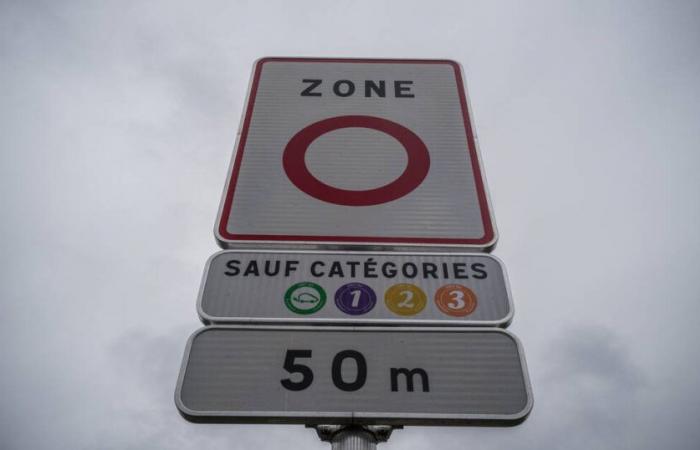From the start of the year, Crit'Air 3 vehicles are banned in Paris, Lyon, Grenoble and Montpellier to encourage the French to buy cleaner ones. In Lille, Caen, Bordeaux and Bayonne, thirty new low-emission zones have been set up.
Even for motorists spared from the post-New Year's Eve migraine, trying to understand the new traffic restrictions in force from this Wednesday, January 1, may seem painful. Certainly Paris, Lyon, Montpellier, Grenoble, Rouen, Reims, Strasbourg, Clermont-Ferrand, Nice, Aix Marseille, Saint-Etienne and Toulouse have already set up ZFEs, that is to say low-emission zones which limit the circulation of the most polluting vehicles. But a new stage was reached at the start of the year: in four metropolises (Paris, Lyon, Grenoble and Montpellier), pre-existing rules were tightened while around thirty new ZFEs were created.
All this was provided for by the mobility orientation law (LOM) of 2019, reinforced in 2021 by the “climate and resilience” law. Objective: to limit the concentration in the air of fine particles harmful to health. In detail, each community can introduce some subtleties, which involves carefully looking at the rules in force near you to avoid exposing yourself to a fine of 68 euros. From 2026, fines will be automatic, via a video control system deployed by the State.
Paris and Lyon, the obligatory ones
Metropolises with recurring problems of exceeding air quality thresholds are the first to be affected. Called “ZFE territories”, they must follow the timetable provided for by law: ban on Crit'air 5 vehicles (diesel cars registered between 1997 and 2000) two years ago, then Crit'air 4 last year ( diesel cars registered between 2001 and 2005) and this year Crit'Air 3 (petrol and hybrid cars registered before 2006 and diesel vehicles registered before 2011). When the law was written, around ten metropolises were in this group forced to regulate. There are only two left, Paris and Lyon. Marseille, Rouen and Strasbourg narrowly escaped the new obligations: in March 2024 they left the list thanks to an improvement in air quality.
In Greater Paris, where the ZFE concerns 77 municipalities, around 422,000 private vehicles and 59,000 additional professionals are therefore excluded from circulation, according to a study by the Parisian town planning workshop (Apur) in 2023. But broad exemptions have been granted: Crit'Air 3 vignette holders will be able to travel freely on weekends and request a day “pass” 24 times. Ultimately, these relaxations make it possible to escape restrictions for more than a third of the year. And there will be no control until the end of 2025, time to educate motorists. “Communities are doing what they can to promote the acceptability of the measures, at least initially, explain Tony Renucci, general director of the Respire association. Then, the provisions will evolve, it will be stricter over the years. Drivers with a parking card for disabled people, associations of general interest and certain professionals (those supplying markets, movers, cinema crews or workers working odd hours, etc.) will be completely spared by regulations.
In the five municipalities of the Lyon metropolitan area concerned, 46,800 vehicles will have to comply with the new rules. However, a maximum of 52 days of exemption will be granted per year for cars equipped with a Crit'Air sticker and workers working irregular hours driving Crit'Air 3 will be exempt from the driving ban.
Montpellier and Grenoble, the volunteers
Although they are not required to do so by law, the metropolises of Montpellier and Grenoble nevertheless want to go further in the regulation of their ZFEs and also apply the ban on Crit'air 3. This is the case for eleven municipalities (i.e. a third) of the Montpellier metropolis, but here too several exemptions are possible, including an exceptional pass for 52 days in the year or even a so-called “small” pass. roller” for vehicles that travel less than 8,000 km per year and. Finally, there will be no checks at least until mid-February.
In Grenoble, vehicles classified Crit'Air 3 are now banned from 13 municipalities, but only during the week and excluding public holidays. The metropolis specifies that a period “pedagogical” without fines is in place until June 30, 2025 as well as a financial support system to help residents abandon their vehicle or change it.
The list of new EPZs
The other novelty at the start of the year is the creation of thirty new ZFEs in towns with more than 150,000 inhabitants. The exhaustive list is as follows: Dunkirk, Lille, Douai Lens, Valenciennes, Amiens, Metz, Nancy, Mulhouse, Dijon, Annemasse, Annecy, Chambéry, Toulon, Avignon, Nîmes, Perpignan, Pau, Bayonne, Bordeaux, Limoges, Orléans, Tours, Angers, Nantes, Le Mans, Brest, Rennes, Caen, Le Havre and Béthune. In these cases, it is a question of respecting the first stage of creating an ZFE, namely the exclusion of so-called “unclassified” vehicles, that is to say registered before 1997 for cars and before May 31, 2000 for motorcycles and mopeds. To ensure compliance with the rules, a Crit'Air sticker, to be affixed to the vehicle's windshield, becomes mandatory – it costs 3.77 euros and can be ordered on the official government website. Each vehicle obtains its classification based on its emissions of fine particles and nitrogen oxides, which depend on age and the fuel used.
In theory, ZFEs are supposed to encourage the French to acquire cleaner vehicles and to prefer public transport or cycling. But the aid is insufficient, regrets Tony Renucci, of the Respire association: “The State has removed the conversion bonus and reduced the ecological bonus. It's completely counterproductive. Some metropolises are offering help but it will not be enough. Before, everything could be combined: in addition to the 6,000 euros from the city of Paris for example, we could add 6,000 euros of conversion bonus and 7,000 of ecological bonus, so it went up to 19,000 euros. For its part, the 40 million motorists association denounces a “anti-social measure”. If it seems irresponsible to ask, as the pro-car lobby does, «l’abrogation pure et simple» ZFEs, a tool for combating air pollution, the latter rightly raises the question of popular ecology so often praised by governments under the current five-year term.






